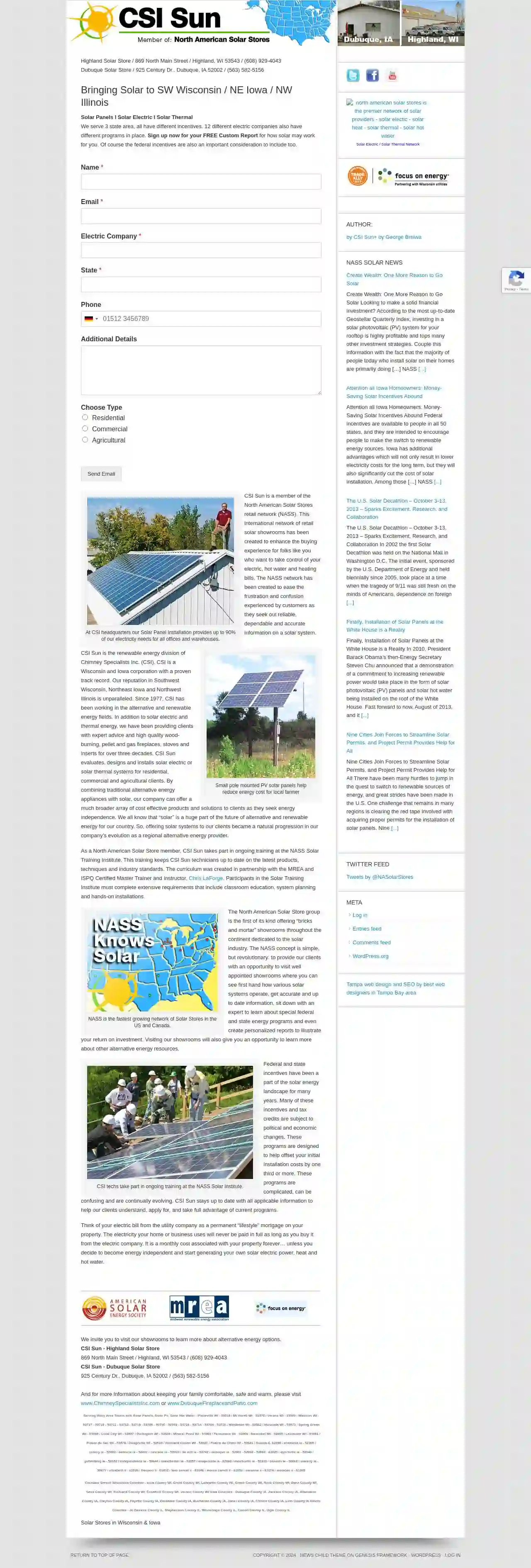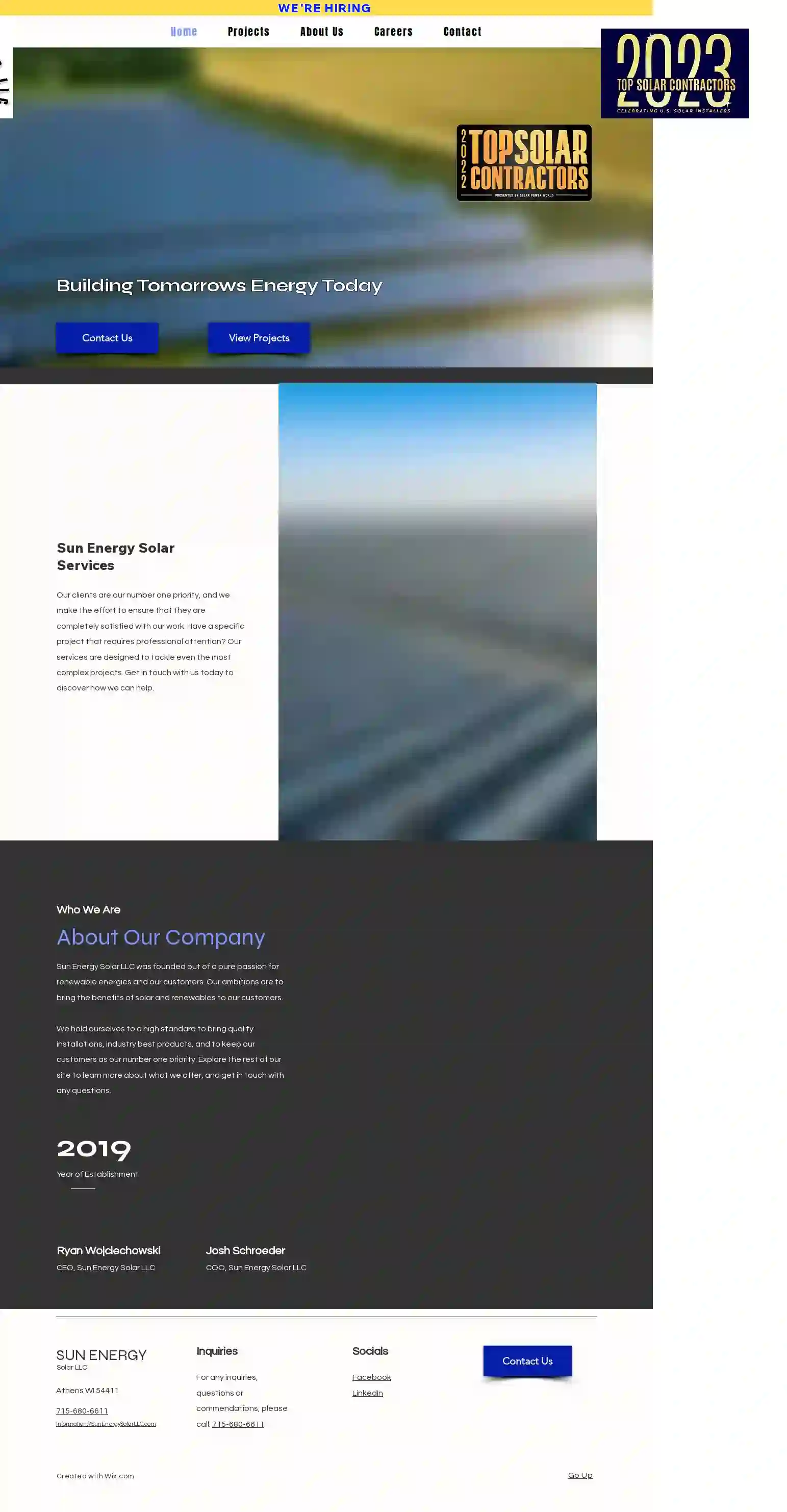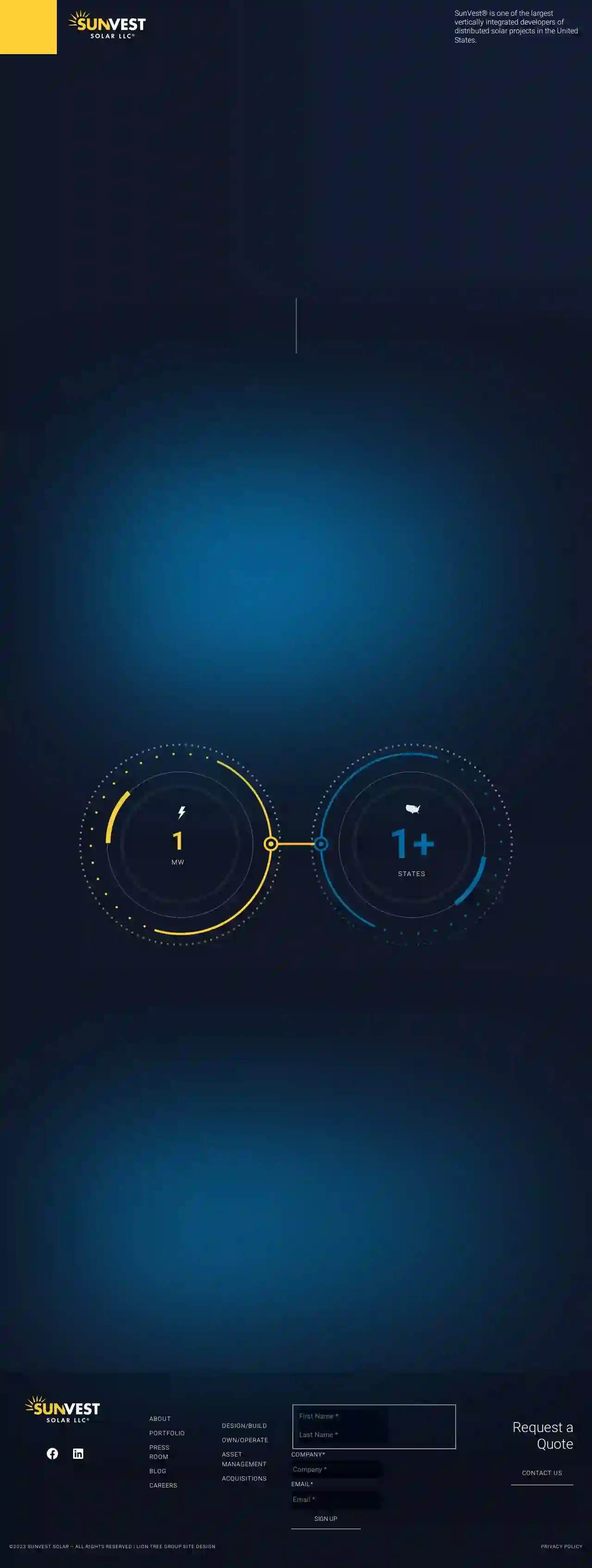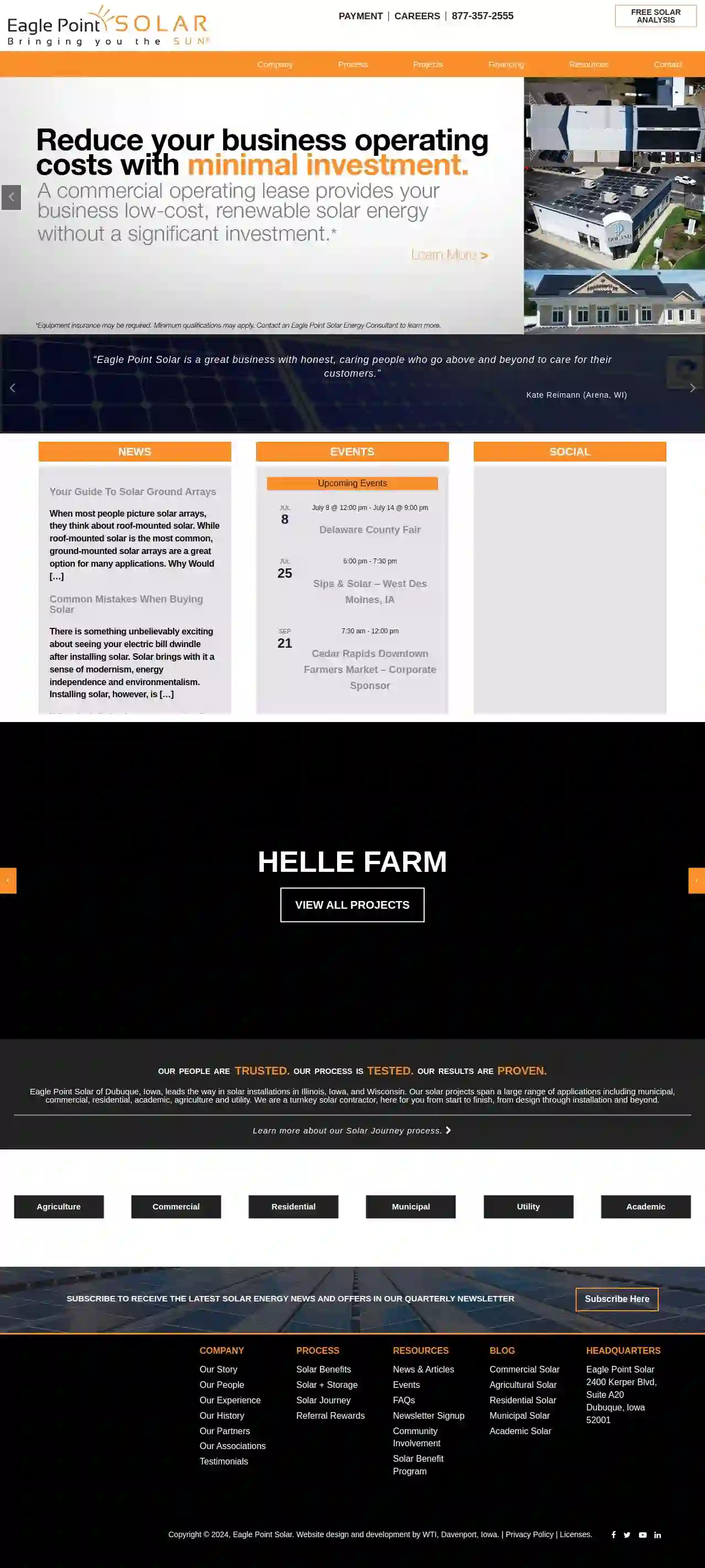Solar Installers Fort Atkinson
Top Solar Panel Installers in Fort Atkinson
Receive multiple Solar Panel Installer quotes for your project today! Compare profiles, reviews, accreditations, portfolio, etc... and choose the best offer.

SunPeak
544 reviews1026 Ann Street, Madison, WI, 53713, USSunPeak Power is a full-service commercial solar PV provider specializing in the design, installation, and maintenance of commercial systems. They offer a comprehensive process, known as the Roadmap to Solar, which includes site assessment, system engineering, procurement, installation, utility interconnection, and operational support. SunPeak is recognized for its commitment to safety and quality, with a zero-incident safety rating and approval from stringent property insurance companies.
- Services
- Why Us?
- Accreditations
- Our Team
- Testimonials
- Gallery
Get Quote
CSI Sun
Highland Solar Store, Highland, WI, 869 North Main Street, 53543, USCSI Sun is a member of the North American Solar Stores retail network (NASS). This international network of retail solar showrooms has been created to enhance the buying experience for folks like you who want to take control of your electric, hot water and heating bills. The NASS network has been created to ease the frustration and confusion experienced by customers as they seek out reliable, dependable and accurate information on a solar system.
- Services
- Why Us?
- Accreditations
- Our Team
- Testimonials
- Gallery
Get Quote
Sun Energy Solar llc
Athens, WI, Athens WI, 54411, USSun Energy Solar LLC was founded out of a pure passion for renewable energies and our customers. Our ambitions are to bring the benefits of solar and renewables to our customers. We hold ourselves to a high standard to bring quality installations, industry best products, and to keep our customers as our number one priority.
- Services
- Why Us?
- Our Team
- Gallery
Get Quote
Epic Electric and Solar Inc.
48 reviewsEpic Electric and Solar Inc., 1310 Droster Rd, 1310 Droster Road, Madison, 53716, USEpic Electric and Solar is a residential electrical service provider specializing in electrical services and solar installations. They are dedicated to providing customer service that is second to none. Their mission is to save customers time and money by combining deep experience, high-quality parts, and dedication to delivering exceptional service.
- Services
- Why Us?
- Accreditations
- Our Team
- Testimonials
- Gallery
Get Quote
SunVest Solar LLC
4.18 reviewsN27 W24025 Paul Ct, Suite 100, Pewaukee, 53072, USSunVest Solar, LLC is one of the largest vertically integrated developers of distributed solar projects in the United States. Our mission is to advance clean energy nationwide with turnkey, cost-effective solar solutions. We offer business, nonprofit, and utility partners expertise across the value chain, including development, construction, financing, and operations. We develop community solar projects in key markets nationwide, distributed solar for commercial/industrial customers, and solar assets for utilities, co-ops, and municipalities.
- Services
- Why Us?
- Accreditations
- Our Team
- Testimonials
- Gallery
Get Quote
Eagle Point Solar
4.5158 reviews2400 Kerper Blvd, Suite A20, Dubuque, 52001, USEagle Point Solar is a leading provider of solar energy solutions, dedicated to helping individuals and businesses harness the power of the sun. With a strong commitment to sustainability and customer satisfaction, Eagle Point Solar offers a range of services including solar panel installation, solar storage solutions, and solar maintenance. Their team of experienced professionals ensures that every project meets the highest standards of quality and efficiency.
- Services
- Why Us?
- Accreditations
- Our Team
- Testimonials
- Gallery
Get Quote
Midwest Solars
53 reviewsMondovi, Wisconsin, United States, 910, Countryside Parkway, 54755, USMidwest Solars, a division of Tecom LLC, started in 2019 as a dream between friends. Tom Wingert, owner of Tecom LLC and Andy Van Roo, decided to form a solar company from the ground up in rural Western Wisconsin. The first project was a commercial building owned by Van Roo. Together, they hope to expand renewable energy in the domestic United States. Tom has a wealth of experience and knowledge with solar in Florida and has worked for Tesla Energy and Amazon. Midwest Solars is actively developing multi Megawatt Projects in Wisconsin, Texas, Ohio, Pennsylvania, Virginia, and Vermont. They serve all 50 states.
- Services
- Why Us?
- Accreditations
- Our Team
- Testimonials
- Gallery
Get Quote
Solarus
3.6132 reviews440 East Grand Avenue, Wisconsin Rapids, WI 54494, 54494, USSolarus is a locally owned and invested company that provides fast, reliable, and affordable fiber internet services. They offer various speed options including Economy, Family, Deluxe, Premium, and Ultra, catering to different needs and budgets. The company is committed to the success of the communities they serve and has a strong presence in Wisconsin Rapids and Manawa. They provide 24/7 local tech support and have a team of knowledgeable and professional staff. Solarus also supports local initiatives and community events, demonstrating their commitment to giving back.
- Services
- Why Us?
- Accreditations
- Our Team
- Testimonials
- Gallery
Get Quote
Renew Wisconsin Inc
4.25 reviewsSuite 300, Madison, WI, 214 North Hamilton Street, 53703, USRENEW Wisconsin is a nonprofit organization dedicated to building a stronger, healthier, more vibrant Wisconsin through the advancement of renewable energy. We work on policies and programs that expand solar power, wind power, renewable fuels, local hydropower, building electrification, energy storage, and electric vehicles.
- Services
- Why Us?
- Accreditations
- Our Team
- Testimonials
- Gallery
Get Quote
Everlight Solar
4.5852 reviewsVerona, WI, 1155 Ambition St, Suite 100, 53593, USEverlight Solar is a leading provider of solar energy solutions, dedicated to helping homeowners and businesses harness the power of the sun to save money and reduce their carbon footprint. With a team of experienced professionals and a commitment to quality, Everlight Solar offers a range of services including solar panel installation, maintenance, and repair. They are certified by NABCEP and have received numerous awards for their work, including being named one of the fastest growing companies in the US by Inc. 5000.
- Services
- Why Us?
- Accreditations
- Our Team
- Testimonials
- Gallery
Get Quote
Over 4,210+ Solar Installers on our platform
Our solar pros operate in Fort Atkinson & surrounding areas!
SolarCompaniesHub has curated and vetted Top Solar Companies in and around Fort Atkinson. Find the most reliable pro today.
Frequently Asked Questions About Solar Installers
- Keep Panels Clean: Clean panels periodically to remove dirt, debris, and bird droppings, which can reduce efficiency. Rainfall usually cleans panels adequately, but you might need to hose them down occasionally.
- Visual Inspections: Regularly inspect panels for signs of damage, loose wiring, or other issues.
- Professional Maintenance: Consider having a professional solar installer inspect your system every few years to ensure optimal performance.
- Use a Directory Like SolarCompaniesHub: We connect you with pre-screened, qualified solar installers in your area.
- Check Online Reviews: Look for positive reviews on Google, Yelp, and other reputable sources.
- Ask for Referrals: Get recommendations from friends, family, or neighbors who have gone solar.
- Verify Credentials: Ensure the installer is licensed, insured, and certified by reputable organizations (e.g., NABCEP in the US).
- Get Multiple Quotes: Compare quotes from at least 3-4 installers to find the best value for your project.
- Ask Questions: Don't hesitate to ask installers about their experience, warranties, and the process they follow.
How do I maintain my solar panels?
Can I go completely off-grid with solar panels?
How do I find a good solar installer near me?
How do solar panels work?
How do I maintain my solar panels?
- Keep Panels Clean: Clean panels periodically to remove dirt, debris, and bird droppings, which can reduce efficiency. Rainfall usually cleans panels adequately, but you might need to hose them down occasionally.
- Visual Inspections: Regularly inspect panels for signs of damage, loose wiring, or other issues.
- Professional Maintenance: Consider having a professional solar installer inspect your system every few years to ensure optimal performance.
Can I go completely off-grid with solar panels?
How do I find a good solar installer near me?
- Use a Directory Like SolarCompaniesHub: We connect you with pre-screened, qualified solar installers in your area.
- Check Online Reviews: Look for positive reviews on Google, Yelp, and other reputable sources.
- Ask for Referrals: Get recommendations from friends, family, or neighbors who have gone solar.
- Verify Credentials: Ensure the installer is licensed, insured, and certified by reputable organizations (e.g., NABCEP in the US).
- Get Multiple Quotes: Compare quotes from at least 3-4 installers to find the best value for your project.
- Ask Questions: Don't hesitate to ask installers about their experience, warranties, and the process they follow.